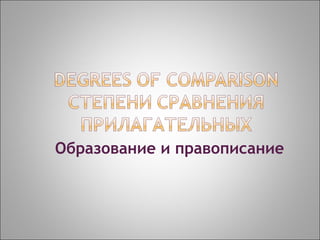Degrees of comparison
- 2. ï Read and explain Big bigger the biggest
- 3. ï The Positive Degree Warm Cold Kind Happy Warmer Colder ï The Comparative Degree Kinder Happier Warmest The Coldest ï The Superlative Degree Kindest The Happiest
- 4. âe°ų the A-est ï Warm âwarmer - the warmest ï Cold âcolder â the coldest ï Kind âkinder â the kindest ï Clean âcleaner â the cleanest ï Tall âtaller â the tallest ï Old âolder â the oldest
- 5. ÐĢÐīÐēÐūÐĩÐ―ÐļÐĩ ÐŋÐūŅÐŧÐĩÐīÐ―ÐĩÐđ ŅÐūÐģÐŧаŅÐ―ÐūÐđ ï Hot â hotter â the hottest ï Big â bigger â the biggest ÐŅКÐēа Ðĩ Ð―Ð° КÐūÐ―ŅÐĩ ŅÐŧÐūÐēа ÐūÐŋŅŅКаÐĩŅŅŅ ï Large â larger âthe largest ï Nice â nicer â the nicest ï Fine â finer â the finest
- 6. ÐŅКÐēа y Ð―Ð° КÐūÐ―ŅÐĩ ŅÐŧÐūÐēа ОÐĩÐ―ŅÐĩŅŅŅ Ð―Ð° i ï Dirty â dirtier â the dirtiest ï Happy â happier â the happiest ï Sunny â sunnier â the sunniest ï Frosty â frostier â the frostiest ï Funny â funnier â the funniest
- 7. ï Old â older â the oldest ï Clean - âĶ - ... ï Big - âĶ - ... ï Kind - âĶ - ... ï Long - âĶ - âĶ ï Clever - âĶ - ... ï Large - âĶ - âĶ ï Tall - âĶ - ... ï High - âĶ - âĶ ï Warm - âĶ - ... ï Sunny - âĶ - âĶ ï Hot - âĶ - ... ï Funny - âĶ - âĶ ï Nice - âĶ - ... ï Happy - âĶ - âĶ ï Cold - âĶ - ...
- 8. ï A dog is bigger than a cat A tiger is stronger than a wolf
- 9. Tall/short giraffe camel
- 10. Funny/sad monkey bear
- 11. Big/small Strong/weak elephant horse An elephant is bigger than a horse
- 14. ï Old â older â the oldest ï Big - âĶ - ... ï bigger â the biggest ï Long - âĶ - âĶ ï longer â the longest ï Large - âĶ - âĶ ï larger - the largest ï Nice - âĶ - âĶ ï nicer â the nicest ï Sunny - âĶ - âĶ ï sunnier â the sunniest ï Funny - âĶ - âĶ ï funnier â the funniest ï Happy - âĶ - âĶ ï happier â the happiest














